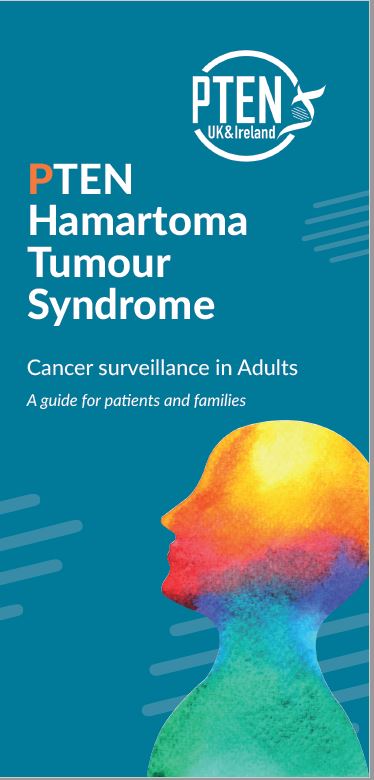Screening Guidelines
There are differences in opinion on screening in the patient and medical professional world, including across different countries, as there are cons (e.g. stress, false positives) as well as pros (e.g. identifying issues early) to screening. If you are worried, always seek proper medical advice.
This is the link to the official UK screening guidelines for PHTS patients in the UK from the UK Cancer Genetics Group (UKCGG) –
https://www.ukcgg.org/news/pten-management-guidelines/
which includes:
- Guidelines for management of tumour risk – https://www.ukcgg.org/media/10879/pten_management_-_cgg_4may2017.pdf, shown in the table below as well.
- National Audit of Screening Advice given to PHTS Patients –
The guidelines were ratified by the UKCGG which is the representative national body for Cancer Genetics. CGG is part of the British Society of Genetic Medicine http://www.bsgm.org.uk
UK Guidelines for management of tumour risk in PTEN hamartoma syndrome (UK Cancer Genetic Group – v1.0 May 2017)
|
Cancer risk |
Risk data |
Screening advice |
|
Breast |
Cancer – lifetime up to 85% Average age at diagnosis 38-46 High incidence of fibrocystic breast disease |
BRCA-equivalent |
|
Thyroid |
Cancer – lifetime 35% |
As a minimum annual screen from 16 by USS. Younger as guided by family history or after informed discussion with family. |
|
Endometrial |
Cancer – lifetime up to 28% Risk starts late 30s – early 40s Benign uterine fibroids very common. |
Refer to specialist Gynaecologist age 35-40 for discussion regarding screening options and management of non-cancer manifestations Consider risk-reducing hysterectomy |
|
Renal |
Cancer – lifetime up to 35% (mostly papillary) |
Annual renal USS/MRI from 40 |
|
Colorectal |
Cancer – lifetime up to 9% Risk starts late 30s |
Ascertainment colonoscopy at age 35 and 55 Polyp f/u as required |
Skin & vascular system |
Melanoma – ~5% |
Baseline dermatological review & appropriate f/u |
Brain |
Lhermitte-Duclos disease – up to 32% |
Brain MRI only if symptomatic |
U.S. Guidelines
The guidelines in the U.S. can be found on the National Comprehensive Cancer Network website in the “NCCN Clinical Practice Guidelines in Oncology (NCCN Guidelines®) for Genetic/Familial High-Risk Assessment: Breast and Ovarian.” publication here:
https://www.nccn.org/professionals/physician_gls/pdf/genetics_screening.pdf
(requires creating a free login/account)
If you are not able to access the guidelines from the site above, a copy is held here on the ptenuki.org website: nccn genetics_screening Jul18

